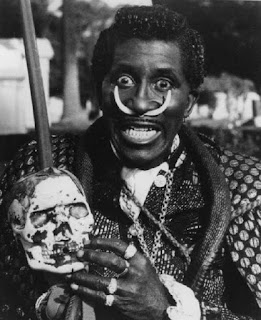Photo by John Gray (1975)
I.
I know that English historians who specialise in the early modern period will be keen to inform everyone they meet that today is the 540th anniversary of the Battle of Bosworth Field; i.e., the last major battle of the War of the Roses and the one in which Richard III bravely met his end (thereby bringing down the curtain on the Plantagenet dynasty and allowing the age of the Tudors to commence).
And I know that English historians who prefer to get excited about the English Civil War will be reminding others that, on this day in 1642, Charles I raised his standard in Nottingham and effectively challenged the Parliamentarians to a fight (which, of course, did not end well for him and his fellow Royalists - losing not just his crown but his head seven years later).
II.
However, as a cultural critic more concerned with the art, fashion, and politics between 1870 and the present day, for me the most exciting event that happened on this date happened in 1975 at the Roebuck (354 King's Road) - namely, the first meeting between 19-year-old John Lydon and the other members of the band who were to become known as the Sex Pistols: Steve Jones, Paul Cook, and Glen Matlock.
As Paul Gorman notes, at the time Lydon "cut a remarkable figure visually [...] he had cropped and dyed his spiky fair hair [...] and wore distressed and customised clothing" [1], most notably a torn Pink Floyd T-shirt upon which he had scawled the words I HATE above the band's logo.
Steve Jones - who christened Lydon 'Johnny Rotten' because of his green teeth - may have thought (rightly) that he was an arsehole, but he had also to admit Lydon had style, attitude, and intelligence.
And Malcolm agreed: after Lydon auditioned to be the group's singer by miming to a self-chosen track by Alice Cooper that happened to be on the jukebox at SEX [2], McLaren instantly recognised the young man had star quality (the band members were not quite so convinced of this, but McLaren was insistent that they had found the perfect frontman - even if he couldn't sing).
III.
Nietzsche writes that he is the kind of philosopher who breaks history in two; that one day mankind will mark time before him and after him [3].
Perhaps we might say the same of the Sex Pistols in relation to popular culture.
Indeed, we might also say of the latter what Nietzsche further says of himself: one day, there will be associated with their name the recollection of something momentous; of a No-saying to everything that until they came along had been believed in as the Good, the True, and the Beautiful, but which was dismissed in 1977 with but a single phrase: never mind the bollocks!
They were, by far, the most terrible band there has ever been; but also the most necessary; anarcho-nihilists who knew joy in destruction and believed in the ruins.
What a shame then, that, fifty years on, Jones, Cook, and Matlock are performing punk karaoke with Frank Carter fronting a kind of ersatz version of the Sex Pistols and Rotten ... well, don't get me started on the abject figure he has become ... [4]
Sex Pistols: Johnny Rotten, Glen Matlock, Steve Jones and Paul Cook
Reworking John Gray's 1975 photo fifty years on (SA/2025)
Notes
[1] Paul Gorman, The Life and Times of Malcolm McLaren (Constable, 2020), p. 278.
[2] The track in question was 'I'm Eighteen', released as a single in November 1970, it also featured on the album Love It to Death (Warner Bros., 1971). To listen to the song on YouTube, click here.
[3] See Ecce Homo, trans. R. J. Hollingdale (Pengin books, 1979), 'Why I Am a Destiny' (8), p. 133.
[4] I make my views clear on Rotten in a number of posts written over the last 12 years: click here, here, and here, for example.


